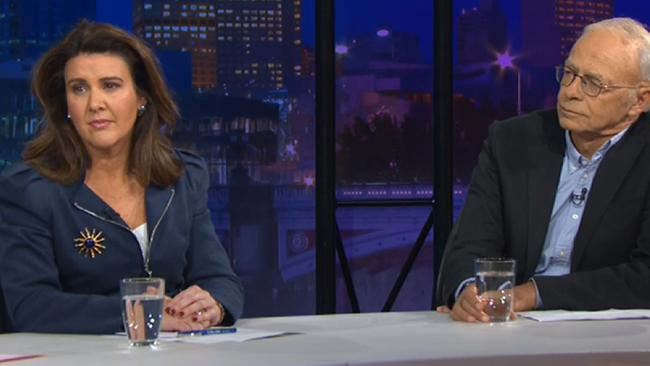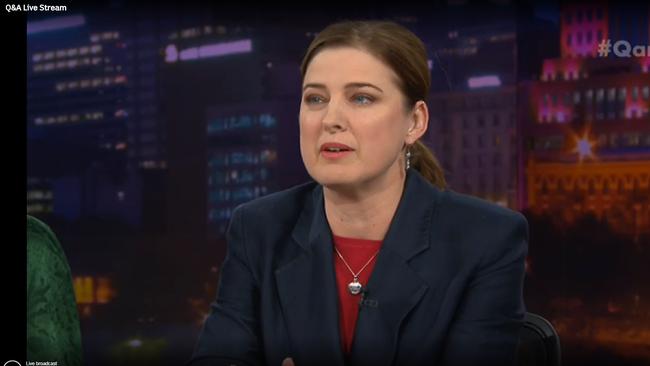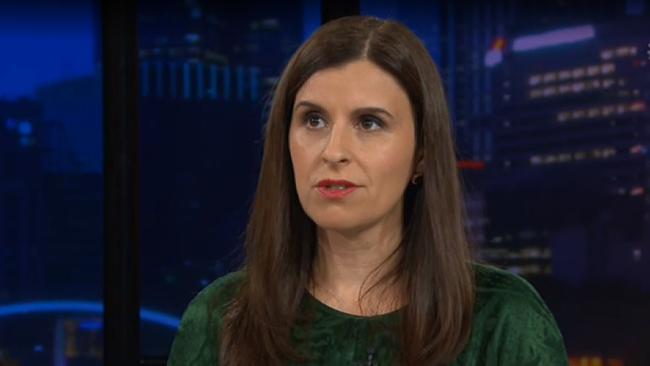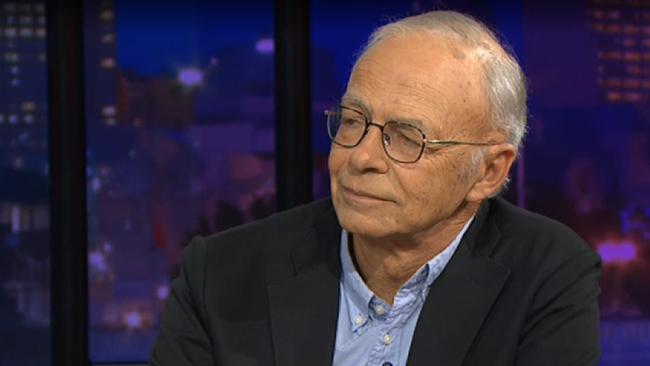Q&A: ‘The royal wedding has killed off the idea of Australia becoming a republic’
THE royal family has been described as “sick to its core” and the Prince Harry and Meghan’s wedding a “strategic marriage” during a fiery Q&A.

THE ROYAL wedding between Prince Harry and Meghan Markle was one of the most watched televised events in the world’s history.
But what was it about this real-life fairytale that captivated some two billion people around the globe and 2.5 million Australians?
It was a topic that the ABC’s Q&A panel discussed on Monday night’s program, prompting fierce debate about whether or not the couple’s undeniable popularity signalled a collective desire for Australia to shun the notion of becoming a republic once and for all.
Panellist from The Australian, foreign affairs editor Greg Sheridan, described the royal wedding as “genius PR by the British royal family” because it had greatly improved its public image.
“I’m sure Harry loves Meghan and Meghan loves Harry, but this was a strategic marriage,” Mr Sheridan said.
“It makes the monarchy multicultural, hip, and suddenly people of colour can identify with the royal family.”
Victoria Liberal party senator Jane Hume said she was initially concerned about the wedding “turning into a bit of a circus” because of the “Markle debacle” that plagued the family in the lead up to Saturday’s ceremony. But her fears were soon allayed.
“I was really proud and had a little tear in my eye, along with most Australians, on Saturday night,” Ms Hume said.
“I was watching it and the football at the same time. I love the fact Harry and Meghan do tend to bring a more contemporary edge to the monarchy and make it more relevant for young people.
“They feel more accessible and more approachable. I think they take their humanitarian work very seriously. It’s a terrific addition to the monarchy.” It was a sentiment echoed by thousands of Australians who declared their admiration for the royals on social media while watching the royal wedding.

But according to Ms Hume, intense interest in the royal wedding did not equate to the concept of Australia becoming a republic having been “killed off”.
“I think it’s an entirely separate issue and an awful lot of republicans were watching. Had a tear in their eye,” she said.
“I think you could have enjoyed the royal wedding without being a monarchist.”
#qanda we don’t care! about the royal wedding. at all.
— Joanna Maidment (@MsJmaid) May 21, 2018
Diversity politics doesn't erase the racism at the core of this institution#QandA
— Sara Saleh (@SaraSalehOz) May 21, 2018
Opposition minister for ageing and mental health, Julie Collins said Australia was a “free and independent country” and should have its own head of state.
“I’ve always believed that,” she said.
“The royal wedding hasn’t changed my mind and I don’t think it will change many other Australians minds.
“[The royals aren’t] relevant to Australia anymore. Yes, it was a lovely wedding. Yes,
they’re clearly in love.”


Author and academic Randa Abdel-Fattah was less sentimental. She told the panel that the monarchy represented “an institution of imperialism and racism”.
“It has been enriched by that: by corruption, imperialism, racism, slavery and for me it’s not just suddenly we have a bi-racial bride and that diversity politics erases the history of that institution,” she said.
“For me, we need to be critical and we shouldn’t lose our critical eye when we look at these things and not be seduced by the pomp and ceremony and recognise what this institution stands for.”
#qanda for 2 hours I witnessed history without talk of Trump, guns, school shootings and wars. I’m taking that time-out and enjoying it for what it is, just a happy occasion
— Lauren K (@lolly375) May 21, 2018
@QandA A love of the monarchy is cultural and traditional for baby boomers like myself, who grew with it.People forget that the royals use their position to promote and support charities. My ancestors were English, maternal and paternal.
— deanna buffier (@debuf1) May 21, 2018
Ms Abdel-Fattah said that royal wedding enthusiasts had their priorities askew.
“The fact that homeless people were taken away from the streets [and] the Grenfell fire people have not been compensated: These are the real issues,” she said.
“Not what Meghan was wearing and whether or not she’s now reformed an institution that is sick at its core.”
Last week, University of Sydney researcher Luke Mansillo — who has analysed trends in Australia’s sometimes wavering support for the royal family during the past few decades — said the royal wedding was expected to provide the monarchy with a popularity boost.
Based on research he had published in 2016, Mr Mansillo found support for the monarchy in Australia began to wane in the 1960s and crashed to a low about the time of the republic referendum in 1999.
.@SenatorHume thought the young Royals are more relevant & accessible. @JulieCollinsMP will stay a republican. @PeterSinger didn't watch #QandA pic.twitter.com/61jN9SSe2A
— ABC Q&A (@QandA) May 21, 2018
However, since then, there’s been a slow but steady improvement aided in part by events including Prince William and Kate Middleton’s wedding in 2011 and the births of their three children.
“Events such as royal weddings contribute to improvements as people get to witness the grandeur, the splendour, the pomp and ceremony and this self legitimises the institution,” Mr Mansillo said.
“After Kate and William’s wedding I found that there was a pretty big bump in the number of people who saw that royalty was important, a seven to eight per cent increase in how many people who thought that what these people do for Australia is important.” Mr Mansillo’s research, published in the Australian Journal of Political Science, found support in Australia for the monarchy hit its lowest point about the turn of the century.
During the 1990s, the royals were rocked by scandals leading up to the 1996 divorces of Prince Charles and Princess Diana, and Prince Andrew and Sarah Ferguson.
It was also the decade that debate about Australia becoming a republic ramped up before the 1999 referendum.
At the same time, there was a sharp dip in support among Australians for retaining the monarchy and those who believed the Queen was important, Mr Mansillo’s research found.
However, that fall in support bottomed out about 2001 and 2002 and has risen steadily ever since.
Mr Mansillo attributed that to many young Australians, particularly Generation Y, having no memory of the royal scandals of the 1990s.
“And because we don’t have royal scandals (the Australian Republican Movement’s national chair) Peter FitzSimons can’t get up and complain about it with a really, really big megaphone,” he said.
“So there’s fewer bad media images and stories about the royals coming out from London and more good stories which make it very difficult to campaign against.” The most recent Newspoll on support for an Australian republic, published in April, found support for the monarchy was at 41 per cent — its highest level in 18 years.
Fifty per cent said they wanted a republic, with nine per cent uncommitted.

Addressing the Q&A panel on Monday night, philosopher Peter Singer said the push for Australia to become a republic had lost its momentum long before Harry and Meghan had even met.
“Republicanism goes off the agenda when the former head of the Australian Republican Movement becomes the Liberal prime minister and doesn’t show any interest in pursuing [it],” he said in a reference to prime minister Malcolm Turnbull’s past role as Chair of the organisation.
— With AAP




